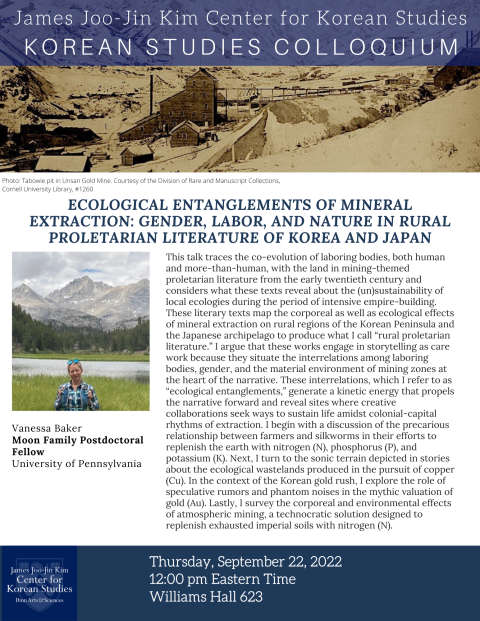
Korean Studies Colloquium
Williams Hall 623
This talk traces the co-evolution of laboring bodies, both human and more-than-human, with the land in mining-themed proletarian literature from the early twentieth century and considers what these texts reveal about the (un)sustainability of local ecologies during the period of intensive empire-building. These literary texts map the corporeal as well as ecological effects of mineral extraction on rural regions of the Korean Peninsula and the Japanese archipelago to produce what I call “rural proletarian literature.” I argue that these works engage in storytelling as care work because they situate the interrelations among laboring bodies, gender, and the material environment of mining zones at the heart of the narrative. These interrelations, which I refer to as “ecological entanglements,” generate a kinetic energy that propels the narrative forward and reveal sites where creative collaborations seek ways to sustain life amidst colonial-capital rhythms of extraction. I begin with a discussion of the precarious relationship between farmers and silkworms in their efforts to replenish the earth with nitrogen (N), phosphorus (P), and potassium (K). Next, I turn to the sonic terrain depicted in stories about the ecological wastelands produced in the pursuit of copper (Cu). In the context of the Korean gold rush, I explore the role of speculative rumors and phantom noises in the mythic valuation of gold (Au). Lastly, I survey the corporeal and environmental effects of atmospheric mining, a technocratic solution designed to replenish exhausted imperial soils with nitrogen (N).
Vanessa Baker works in the field of the environmental humanities and is interested in what literature reveals about the (un)sustainability of local ecologies during a period of intensive empire-building in East Asia. Her doctoral dissertation, “Entangled Ecologies of the Everyday: Gender, Labor, and Nature in Rural Proletarian Literature of Korea and Japan,” traces the co-evolution of laboring bodies with the land in the process of mineral extraction. This project places a critical focus on stories about the rural regions of the Korean Peninsula and the Japanese archipelago where the material axis of empire was produced. The group of texts she refers to as “rural proletarian literature” locates the interrelations among gender, labor, and the material environment at the heart of the narrative; these entanglements generate a kinetic energy that propels the narrative forward. In the textual analysis, she surveys the wastelands generated in colonial-capital mining ventures, but also highlights the creative collaborations that cultivate spaces for the futurity of life. Her research interests include environmental history, feminist materialism, indigenous studies, political economy, new materialisms, and sound studies. Vanessa received her B.A. in East Asian Studies from Bard College, her M.A. in Modern Japanese Literature from Columbia University, and her Ph.D. in East Asian Studies with a Feminist Emphasis at the University of California, Irvine.
 James Joo-Jin Kim Center for Korean Studies
James Joo-Jin Kim Center for Korean Studies